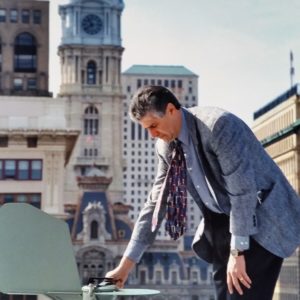Philadelphia Inquirer Health: Sneezing Your Head Off?
 May 4, 2018
May 4, 2018
As published in The Philadelphia Inquirer and Philly.com by Mari A. Schaefer
If you are sneezing up a storm, have a runny nose, and red, watery eyes, you are not alone. Spring, and all the pollen that comes with it, has finally arrived in the region.
What are the biggest culprits right now? Trees and grass, Dvorin said.
“Oak is predominant right now,” said Dvorin. Mulberry, a very common street tree in Philadelphia, is showing up at high levels. Maple has come and gone, he said.
The pollen count for trees is checking in at 6,889.9, which is extreme. Anything over 3,000 is considered high for tree pollen numbers.
Grass, which can cause symptoms at much lower levels, is at 15.1. Anything above 10 is considered problematic for allergy sufferers.
Mold spores are also causing symptoms right now. They were counted at a moderate level of 1,447.5

To determine local counts, Dvorin captures pollen using a Burkard Spore Trap on the roof of his North Broad Street office. The pollen goes into the cylindrical machine and lands on a glass slide, which he retrieves each day.
The pollen that is causing allergy havoc is the powdery substance that is carried by the wind. The pollen on flowering plants makes its way around on bees, Dvorin said.
“We did kind of expect this, because the temperatures are kind of extreme, but you don’t know until the peak of the pollen count comes,” said Dvorin.
If you are experiencing allergy symptoms, John Cohn, director of allergy and immunology at Thomas Jefferson University Hospital, suggests you spend more time indoors.
Cohn said that allergies tend to be more prevalent in younger people and that could be because they like to be outdoors more.
He also suggests taking a shower after coming inside and wearing a hat to keep pollen off your body. If you can, turn on the air conditioner and close the windows at night, he said.
“Plants pollinate more in the early morning,” Cohn said.
Over-the-counter remedies can bring relief for most allergy sufferers. People with high blood pressure should be aware that decongestants can raise their numbers. Also, antihistamines can cause more difficulty for those with prostate problems, Cohn said.
If your symptoms are extreme, consider seeing an allergist so you can avoid the misery next spring.
“The goal is for people to function and do the things they enjoy,” Cohn said.
The good news is that the season and symptoms will eventually pass.
“If we get a lot of rain this weekend … it will wash a lot of the pollen out of the air,” Cohn said.
Original article published on Philly.com and published in The Philadelphia Inquirer












